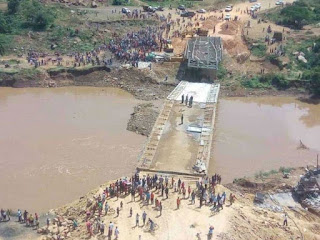China’s debt-trap diplomacy hit; Kenyan court halts $3.2-billion project
A Kenyan Appellate Court has halted the dragon’s African safari by pronouncing that “the $3.2 billion contract between Kenya and China for the construction of the Standard Gauge Railways (SGR) is illegal.” The recent judgment has lifted the lid on the dragon’s “debt-trap diplomacy.” china news
China has built the railway line under its ambitious Belt and Road Initiative (BRI) by giving huge loans. Kenya has been under pressure to pay its debts while handling the financial implications of the Chinese virus pandemic.
Since 2013, Kenya has accepted more than $5 billion loans from China for SGR construction, making it the largest infrastructure project of the country. But in its first year of operation, the project reported losses equivalent to $98 million, making Kenya’s serving of the loans unmanageable.
Dragon eyes Mombasa Port
The railway project is funded on the terms that could end up giving China control over some of Kenya’s most important assets. If Kenya fails to repay the huge load advanced by a Chinese lender, it risks losing the lucrative Mombasa Port.
The loans were granted for the development of standard gauge railway project. The terms of the loan for the Kenya Railways Corporation (KRC) specify that the port’s assets are collateral, and they are not protected by Kenya’s sovereign immunity due to a waiver in the contract.
Mombasa, the largest and most valuable port in east Africa, is not just the gateway into Kenya, but also into its landlocked neighboring nations Burundi, Congo, Rwanda, South Sudan and Uganda. Therefore, losing control over the port would mean erosion of Kenya’s sovereignty.
In addition to the Mombasa Port, Kenya could also be made to give China control of the Inland Container Depot in Nairobi. Kenyan media reported that “implications of a takeover would be grave, including the thousands of port workers, who would be forced to work under Chinese lenders.”
Kenya is one of China’s largest trade partners in Africa and owes $6.5 billion to China, 21.9 per cent of its total external debt. China’s interest payments represent 87 per cent of the cash used to service debt expenditure in 2019.
Repayment of the debts still needs to be worked out but it will at least stop Kenya from accepting further bad loans. The appellate court’s decision might just allow the Kenyan government to come out of the Chinese sinkhole of debt-trap.
China biggest creditor to Africa
Debt-trap diplomacy is a deceptive method adopted by China under the BRI scheme, wherein the Chinese first lend huge monies under opaque loan terms to unsuspecting developing nations in the garb of development, only to strategically leverage the recipient country’s indebtedness for its own economic, military, or political ends or to seize its assets as a means of repayment.
For example, China had given a loan to develop a strategic port in Djibouti. In 2017, Djibouti’s debt was projected staggering at 88 per cent of its GDP, with China responsible for the bulk of this debt. Djibouti had fallen victim to China’s debt-trap and let the dragon nation build its first overseas military base there. China’s first and only overseas military base is a consequence, not a coincidence.
In September 2018, Zambia lost the Kenneth Kaunda International Airport to China over debt repayment in similar circumstances. Elsewhere in Africa Burundi, Chad, Mozambique and Zambia are all either in debt distress or at high risk of it, a situation China’s predatory lending practices are aggravating.
Angola is looking to secure debt relief from China by offering equity stakes in six oilfields of Sonangol Sinopec International. Two-fifths of Angola’s external debt is in oil-backed loans and the country previously sent oil cargoes to China as its form of loan repayments. However, Angola has cut down the number of oil cargoes shipped to China in a move to renegotiate terms and deal with the impact of Covid-19 pandemic.
Last year, China agreed to restructure more than $12 billion in repayments for Ethiopia, whose Chinese-funded railway is also struggling.
As China’s influence is increasing in the region, African nations are wary of the dragon’s debt-trap strategy and fears that its infrastructure projects overload with debts. Africans know that all loans lead to high risk and Chinese infrastructural loans are notoriously opaque, therefore, it is difficult to determine exactly what was intended in each different case.
Infrastructure development has been a strategy of China’s African domination game plan and the BRI Initiative is its vehicle. But China’s nefarious designs are getting exposed. The latest setback comes from Kenya via a court ruling will have a far-reaching consequence in Africa-China relationships.

Comments
Post a Comment